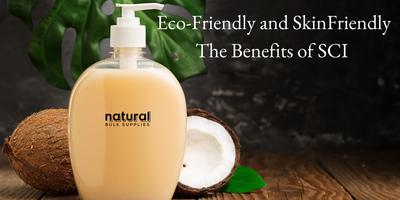The Ultimate Guide to Sodium Cocoyl Isethionate (SCI): A Gentle Surfactant for Personal Care Products
Posted by Natural Bulk Supplies on on Sep 1st 2024
The Ultimate Guide to Sodium Cocoyl Isethionate (SCI): A Gentle Surfactant for Personal Care Products
Sodium Cocoyl Isethionate (SCI) is one of the most popular ingredients in modern sulfate-free personal care formulations. As a mild surfactant derived from coconut oil, it delivers a luxurious foam and effective cleansing without irritation making it a preferred choice for sensitive-skin and eco-friendly products.
From solid shampoo bars to creamy face washes, SCI powder gives formulators the ability to create rich, soft-lathering cleansers that feel gentle yet effective.
What Is Sodium Cocoyl Isethionate (SCI)?
Sodium Cocoyl Isethionate, or SCI surfactant, is the sodium salt of esterified coconut fatty acid and isethionic acid. It’s widely used in sulfate-free shampoos, body washes, and cleansing bars as a gentle surfactant that removes impurities without damaging the skin’s natural moisture barrier.
INCI Name: Sodium Cocoyl Isethionate
Molecular Formula: C18H35NaO3S
CAS Number: 61789-32-0
Appearance: White powder, flakes, or noodles
Solubility: Water-soluble, suitable for both solid and liquid formulations
Key Benefits of Sodium Cocoyl Isethionate
1. Mild and Skin-Friendly
SCI is known as one of the gentlest surfactants available. Ideal for sensitive skin, baby care, and facial cleansers, it cleans effectively without stripping natural oils or causing irritation.
2. Luxurious Foam
Despite being sulfate-free, SCI surfactant produces a rich, creamy lather, enhancing the sensory appeal of shampoos and cleansers. It’s the go-to ingredient when you want sulfate-free foam that feels professional and indulgent.
3. Moisturizing Properties
Unlike harsher cleansers, SCI leaves the skin and hair feeling soft and hydrated, not dry or tight. It’s particularly beneficial in dry or eczema-prone skin formulations.
4. Eco-Friendly & Biodegradable
Made from renewable coconut oil, SCI powder is fully biodegradable, making it an ideal ingredient for eco-conscious brands focused on sustainability.
5. Formulation Versatility
SCI works well with emollients, humectants, oils, and conditioning agents, offering formulators the flexibility to design a range of products — from facial cleansers to solid shampoo bars.
Common Applications of Sodium Cocoyl Isethionate
1. Sodium Cocoyl Isethionate in Shampoo
SCI is one of the best sulfate-free surfactants for haircare, providing effective cleansing without stripping the scalp. Perfect for daily shampoos or formulas for sensitive scalps.
Typical usage rate: 3–15%
2. Solid Shampoo & Cleansing Bars
SCI forms the foundation of syndet bars (synthetic detergent bars), adding hardness, rich foam, and mild cleansing. It helps create a long-lasting bar that rinses cleanly.
Usage rate: 20–60%
3. Facial Cleansers
Sodium Cocoyl Isethionate for skin is ideal in gentle facial cleansers. It removes makeup and dirt without irritation, making it great for sensitive or acne-prone skin.
Usage rate: 3–10%
4. Body Washes & Shower Gels
SCI produces a creamy, moisturizing foam and prevents dryness, leaving skin smooth after every wash.
Usage rate: 5–20%
How Does Sodium Cocoyl Isethionate Compare to Other Surfactants?
SCI vs. SLS (Sodium Lauryl Sulfate)
-
SCI: Mild, non-stripping, and moisturizing.
-
SLS: Stronger, can cause dryness and irritation.
SCI is the preferred sulfate-free alternative for sensitive skin.
SCI vs. Sodium Lauroyl Methyl Isethionate (SLMI)
-
Both are sulfate-free surfactants.
-
SLMI is slightly milder but produces less lather.
-
SCI offers creamier foam and is easier to source.
SCI vs. Decyl Glucoside
-
Decyl Glucoside is ultra-gentle but lacks foam density.
-
SCI surfactant provides richer lather and a smoother feel.
For luxurious cleansing, SCI is superior.
Why Sodium Cocoyl Isethionate Is Popular in Sulfate-Free Products
1. Consumer Demand for Gentle Cleansers
Consumers now prefer sulfate-free products that don’t strip hair or skin. SCI mild surfactant meets this demand perfectly it’s gentle yet effective.
2. Eco-Friendly and Biodegradable
Derived from coconut oil, SCI powder supports sustainable formulation goals. It breaks down easily and is safe for water systems.
3. Cross-Category Versatility
From solid shampoo bars to facial cleansers, SCI fits into nearly any product type, making it one of the most versatile surfactants available to formulators.
Frequently Asked Questions About Sodium Cocoyl Isethionate
Q1: What is Sodium Cocoyl Isethionate?
It’s a mild, coconut-derived surfactant used in sulfate-free shampoos, face cleansers, and body washes for gentle cleansing.
Q2: Is Sodium Cocoyl Isethionate a Sulfate?
No. SCI is sulfate-free and does not contain the harsh detergents found in SLS or SLES.
Q3: Is Sodium Cocoyl Isethionate Safe for Skin?
Yes. SCI for skin is non-irritating and ideal for sensitive or dry skin types. It maintains the natural moisture barrier.
Q4: Is SCI Powder Biodegradable?
Yes. It’s derived from renewable coconut oil and is fully biodegradable, making it eco-friendly.
Q5: Can SCI Be Used in Natural Formulations?
While it’s chemically processed, Sodium Cocoyl Isethionate is often accepted in natural-leaning and eco-conscious product lines.
Q6: Does SCI Clog Pores or Cause Acne?
No. SCI is non-comedogenic, meaning it doesn’t clog pores — making it great for facial cleansers and acne-prone skin.
Q7: How Do I Use SCI Powder in Formulations?
To use SCI powder in solid shampoo bars, mix 20–60% with conditioning agents, butters, and oils. Heat and blend for uniform texture and foaming power.
Why Choose Natural Bulk Supplies for SCI Powder
As a leading supplier of Sodium Cocoyl Isethionate, Natural Bulk Supplies provides high-purity SCI surfactant for cosmetic and personal care applications.
-
Available in bulk and wholesale quantities.
-
High-quality, consistent SCI powder for professional manufacturing.
-
Suitable for eco-friendly, sulfate-free, and gentle cleansing products.
Order Bulk SCI: Shop Sodium Cocoyl Isethionate

